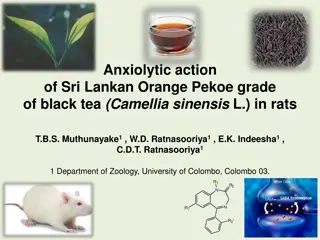A Study on the Followership Role of Graduate Teachers in Sri Lankan Schools
Organizational success hinges on effective leadership and followership. This study delves into the followership styles of graduate teachers in Sri Lanka, exploring variations based on gender, school type, and leadership positions. The research aims to identify and understand different followership roles within educational contexts, shedding light on an often overlooked aspect of teacher dynamics.
Download Presentation

Please find below an Image/Link to download the presentation.
The content on the website is provided AS IS for your information and personal use only. It may not be sold, licensed, or shared on other websites without obtaining consent from the author.If you encounter any issues during the download, it is possible that the publisher has removed the file from their server.
You are allowed to download the files provided on this website for personal or commercial use, subject to the condition that they are used lawfully. All files are the property of their respective owners.
The content on the website is provided AS IS for your information and personal use only. It may not be sold, licensed, or shared on other websites without obtaining consent from the author.
E N D
Presentation Transcript
A STUDY ON THE A STUDY ON THE FOLLOWERSHIP ROLE OF FOLLOWERSHIP ROLE OF GRADUATE TEACHERS IN GRADUATE TEACHERS IN SRI LANKAN SCHOOLS SRI LANKAN SCHOOLS C.P.W Malepathirana Department Social Science Education Faculty of Education University of Colombo
Introduction Introduction Many organizational members perform as followers more often than performing as leaders (Kelley, 1988). The effectiveness of both leadership and followership are equally important for organizational success. School teachers are obligated to perform as leaders and followers simultaneously. Followership role of teachers, have not yet been sufficiently researched in Sri Lankan context.
Objectives of the study Objectives of the study To identify the followership styles of graduate teachers in Sri Lankan schools To study how the followership styles of graduate teachers in Sri Lanka vary in terms of their gender To study how the followership styles of graduate teachers in Sri Lanka vary in terms of the type of school they work for To study how the followership styles of graduate teachers in Sri Lanka vary in terms of their leadership positions at school
Review of literature Review of literature Followership was not sufficiently addressed in research until recently. Followership was traditionally perceived negatively whereas modern literature defines followership to be independent independent and and complementing complementing to leadership. Followership styles of organizational members have been categorized by many scholars. The majority of teachers is found to be exemplary followers Several organizational and personal factors determine followership styles
Robert Kelley Robert Kelley s ( s (1988,1992 1988,1992) followership classification ) followership classification Ind Independent critical thinking ependent critical thinking Alienated Follower Alienated Follower Critical & independent thinking But fails to implement accordingly Has negative attitudes about the organization Does not openly criticize leadership Exemplary Follower Exemplary Follower Also known as effective follower Works for the benefit of organization and self Enthusiastic & risk taking, aware of weaknesses Gets complements from peers and superiors Solves problems independently effective follower Pragmatist Follower Pragmatist Follower A combination of other followership styles Changes the followership style accordingly Passive Passive Active Active Passive Follower Passive Follower Also known as sheep Does not think critically and independently Mechanically performs . Less initiative power and risk taking Avoids participation. Confirmist Follower Confirmist Follower Also know as Yes people Actively perform duties Do not think independently, avoids arguments Very obedient to the leader sheep Yes people Dependent uncritical thinking Dependent uncritical thinking
Research design Research design Research Approach Research Approach Mixed method Research population Research population Graduate teachers of government schools in Sri Lanka Target population Target population Graduate teachers who follow postgraduate diploma in education in University of Colombo Sample Sample 200 graduate teachers from government schools who follow PGDE in University of Colombo in 2016/17 Questionnaire survey based on Robert Kelley s (1992) followership questionnaire Semi structured interviews Data collection Data collection Scatter plots , cross tabulations & Chi square test Qualitative data analysis Data Analysis Data Analysis
Empirical findings : Empirical findings : Followership styles of Sri Lankan graduate teachers 60 60 Exemplary Followers Alienated Followers Independent critical thinking of followers 50 50 40 40 Pragmatist Followers 30 30 20 20 10 10 Passive Followers Conformist Followers 0 0 0 0 10 10 20 20 30 30 40 40 50 50 60 60 Activeness of followers
Empirical findings : Empirical findings : Followership styles of Sri Lankan graduate teachers Exemplary Followers 21% Conformist Followers 3% 4% Passive Followers 72% Pragmatist Followers
Empirical findings : Empirical findings : Followership styles & Gender 90 80 70 Exact Sig. (2-sided) Value 60 50 Pearson Chi Pearson Chi square square Fisher's Exact Fisher's Exact Test Test 40 Male Female 4.992 0.184 30 20 4.696 0.193 10 0 Exemplary Conformist Passive Pragmatist Followership styles Followership styles
Empirical findings : Empirical findings : Followership styles & type of school 45 40 35 Exact Sig. (2-sided) Value 30 25 Pearson Chi Pearson Chi square square Fisher's Exact Fisher's Exact Test Test 1AB 1C Type 2 Type 3 20 19.987 0.015 15 10 15.796 0.031 5 0 Exemplary Conformist Passive Pragmatist Followership styles Followership styles
Empirical findings : Empirical findings : Followership styles & leadership positions at school 140 120 Exact Sig. (2-sided) 100 Value 80 Pearson Chi Pearson Chi square square Fisher's Exact Fisher's Exact Test Test Leaders Non Leaders 60 4.039 0.253 40 20 2.656 0.327 0 Exemplary Conformist Passive Pragmatist Followership styles Followership styles
Empirical findings : Empirical findings : Followership style determinants of exemplary followers Influence of the family Influence of the family School and university education School and university education Influence of coworkers Influence of coworkers Influence of the leaders Influence of the leaders
Conclusion Conclusion A vast majority of graduate teachers in Sri Lankan schools are exemplary followers with higher critical, independent thinking, activeness, self- motivation and cooperativeness. This situation can be negatively impacted by the drawbacks in school types, school culture and institutional factors. Thus, it is essential that the followers should be considered with equal importance as leaders in school environment. Since schools and teachers are powerful factors influencing the followership behavior, teachers should always attempt to be exemplary followers.
References References Ali, H. M., & Al-Anshory, A. S. at Adni Islamic School, Malaysia. IIUM JoUrnal of EdUcatIonal StUdIES, The gap between primay and secondary school teacher followership styles .) 2014 ( , 2 ( 2 ) . 83 - 59 Ammon, R.D.N (2013). Active followership: An essential component of the teacher-principal relationship. Unpublished dissertation presented for the Degree of Master of Arts, University of Victoria Baker, S. D. Followership: The theoretical foundation of a contemporary construct. Journal of Leadership & Organizational Studies, 14, 50 - 60 . .) 2007 ( Billot, J., West, D., Khong, L., Skorobohacz , C., Roxa, T., Murray, S., Bullock, A. employee attachment to the organization. The Psychologist Manager Journal, 12, Followership styles and 111 - 131 . .) 2009 ( Bresnen, M. All things to all people: Perceptions, attributions, and constructions of leadership. The Leadership Quarterly ( 6 ) , 495 - 513 . .) 1995 ( Brown , T. Great leaders need great followers. Industry Weekly, , pp25 .) 1995 ( ) 16 ( 244 Bryman, A. Leadership and Organizations. London.: Routledge. .) 1986 ( Chaleff, I. The Courageous Follower: Standing Up to and for Our Leaders Koehler Publishers. San Francisco: Berrett- .) 1995 ( ( 3 .
References References Collinson, D. Quarterly, Rethinking followership: A post-structuralist analysis of follower identities. Leadership , 179 - 189 . .) 2006 ( 2 ) ( 17 Crippen, C. Management in Education, Enhancing authentic leadership-followership. Strengthening school relationships. 26 ( 4 ) , 192 - 198 . .) 2012 ( Crossman, B., & Crossman, J. 481 - 479 . Conceptualising followership A review of the literature. Leadership, , .) 2011 ( 7 ( 4 ) Curphy, G., & Roellig, M. http://followership 2 . pbworks.com/w/page/ 102633943 S%20SAVED% 2011042015Retrieved from 130114 2016 .12.12 .)Foloowership publications .The followership exchange: / ( FOLLOWERSHIP%20PUBLICATION Frisina, M. Learn to lead by following. Nursing Management, , pp .) 2005 ( ( 3 ) 36 . 12 . Gast, J. The 2003HBR List: Breakthrough ideas for tomorrow s business agenda. Harvard Business 81 ( 4 ) , 92 - 98 . .) 2003 ( Review, Hoption , C. Learning and Developing Followership. Journal of Leadership Education, 13, .) 2014 ( . 137 - 129 Lortie, D. (1975) Schoolteacher: A sociological study. In Goodson, I. (2008). Investigating the teacher's life and work. Sense Publishing.
References References Kellerman, B. What every leader needs to know about followers. Harvard Business Review, , .) 2007 ( ) 12 ( 85 . 91 - 84 Merriam- Webster Online Dictionary. (2005). Follower . Retrieved on December 12, 2016 from http://www.m- w.com/dictionary/follower Maroosis, J. art of followership( Leadership: A Partnership in Reciprocal Following. R. E. Riggio , I. Chaleff , & J. L. Blumen, The . 17 - 24 .) Jossey-Bass: San Fransisco. .) 2008 ( Nolan, J. S., & Harty, H. F. Followership >=leadership. Education, , .) 2001 ( ( 3 ) 104 . 312 - 311 Smith, J.S (2009). Followership behaviors among Florida community college faculty. Unpublished dissertation presented for the Degree of Doctor of Philosophy, University of Florida Smircich, L., & Morgan, G. 257 - 273 . Leadership: The management of meaning. Journal of Applied Behavioral Science, 18, .) 1982 ( Townsend, P. 18 . Fitting teamwork in to the grand scheme of things. Journal of Quality and Participation, , .) 1999 ( ( 1 ) 25 - 16 Wiles, K. Supervision for better schools. Englewood Cliffs: Prentice-Hall. .) 1967 ( Zaleznik, A. (1965). The Dynamics of Subordinacy. In Kellerman, B. (2008). Followership: How followers are creating change and changing leaders (Center for Public Leadership), Boston, MA: Harvard Business School Press
Thank you ! Thank you !
Its your time It s your time Questions are welcomed !























